Navigation
Teens and Sex on the Internet
Online Communication
Identity Formation
In the News
Relationship Quality
Reference Page

Navigation |
||
Teens and Sex on the Internet
Online Communication
Identity Formation
In the News
Relationship Quality
Reference Page
|
 |
|
When internet research began in the early 1990's, it was thought that time spent on the internet would inhibit normal social interactions in real life.
At the time, the main method of communicating online were through chat rooms. As such, encounters on the internet were often between strangers which resulted
in no real benefits being experienced by internet users (Nie, 2001). Adults who spent more time online spent less time with their friends. Adolescents who had fewer
friends- especially fewer close friends- were more likely to use the internet (Mesch, 2001).
However, over the years, the number of homes with internet access has dramatically increased (Lenhart & Madden, 2007). The ways in which people communicate online have also
changed. IM programs and social networking sites such as Facebook and MySpace now allow internet users to talk to people they already have offline
relationships with. As a result, more positive effects have been observed (Bessiere et al, 2008; Valkenburg & Peter, 2007b).
The Internet allows for greater self-disclosure due to greater anonymity as opposed to real-life interaction. People communicating online are less
concerned about how others perceive them and disclose more about themselves as a result. Online communication then becomes intimate (Tidwell & Walther, 2002); this is noteworthy for
adolescents, as they are often shy due to their stage of development. For adolescents, communicating on the internet can become a liberating experience, which
will in turn enhance friendships already in place.
High-quality relationships can act as buffers against stress. Adolescents do not have the experience of having gone through trying times and made it
through okay; to them, every problem seems to be of greater proportion than what it really is. Therefore, when adolescents have high-quality relationships,
they are often happier as opposed to those who do not have such relationships.
Adolescent boys seem to benefit more from online communication than adolescent girls (Schouten, Valkenburg & Peter, 2007). Boys often have trouble expressing their feelings than girls do
in face-to-face interaction (McNelles & Connolly, 1999). Consequently, boys experience greater positive effects from online communication (Schouten et al, 2007).
However, these effects do not appear to hold in interactions between strangers. Social connectedness does not improve, and there may even be negative
benefits. Because of increased anonymity, Internet users not only feel comfortable about disclosing aspects of themselves they would not reveal in real
life, but they also engage in other behaviors such as flaming, online harrassment and cyberbullying. Users who can hide behind an alias experience fewer
reservations because the likelihood of their being discovered decreases. Message boards and social networking sites may ban the user's account, the user
himself experiences no legal consequences for insulting too many people.
For more information, go here.
Valkenberg, Peter M., Peter, Jochen. (2009). Social Consequences of the Internet for Adolescents: A Decade of Research. Current Directions in Psychological Science, 18 (1), 1-5.